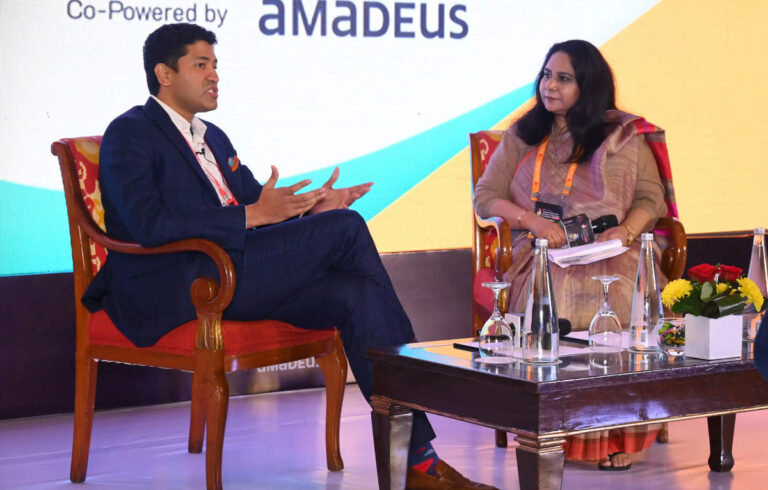
[ad_1]

At a fireside chat at ET Travel & Tourism Conclave & Awards, Santosh Kumar, Country Head (Indian Sub-Continent & Indonesia), Booking.com delved into the platform’s distinctive approach within the Indian market and across the globe. He highlighted several aspects that set the Indian market apart while discussing emerging traveller behaviours, company’s innovative strategies, focus on sustainability and alternate accommodations ruling over traditional hotels.
Platform’s approach to the Indian Market vs Global
Indian travellers have earned the second position among APAC‘s most assured travellers, according to a Booking.com report. Speaking during the session, Kumar highlighted Booking.com’s adaptable platform, consistent across countries but also tailored to unique factors in India, given its burgeoning appeal.
“We started with the pay-at-hotel model, which is still popular here because it suits Indian travelers who like flexibility. Most of our global transactions use a different payment model. Presently, 55 per cent of our global transactions stem from the merchant model, wherein we handle payments for travellers. But in India, the pay-at-hotel system is still a big hit,” he said. This model, he added, offers flexibility and convenience and aligns closely with the Indian consumer psyche, particularly for domestic and outbound travel.
Another unique facet is India’s wide parity market, stated Kumar. “As a fulfillment provider, we maintain consistent pricing across partner platforms, ensuring uniform rates, availability, and conditions, which differs somewhat from global norms. Additionally, the emergence of value-added services and bundled rates caters well to the value-driven preferences of Indian travelers. They seek not only accommodation but also crave inclusive add-ons such as spa treatments, meals, and diverse experiences, making bundled rates a hit in India,” he added.Emerging Traveller Behaviours
Kumar also discussed evolving travel patterns in the Asia Pacific, emphasising a normalisation of travel behaviours post-pandemic, a rise in experiential travel, and an increased awareness of responsible tourism.
“Now, when focusing specifically on the Indian market, we see some distinct behavioural traits. Indians are notoriously late bookers; they tend to have shorter booking windows, meaning they often book closer to their travel dates compared to other nationalities. For India, it is somewhere around 27-28 days, and for international booking the window is roughly three times higher than the domestic booking window,” he revealed.
Food, he said, is another thing playing a significant role in Indian travel experiences. “Indians tend to plan their travel itineraries around culinary experiences, making it an integral part of their exploration. Additionally, there’s a considerable demand for room service among Indian travellers, more so than in many other nationalities,” Kumar said.
He further revealed that group travel is on the rise among Indian travellers across various segments. “This trend has been further amplified by the increasing availability of alternate accommodations in recent years. A noteworthy development has been the surge in unbranded accommodations in tier two and tier three markets, particularly in religious circuits,” he remarked.
What is intriguing according to Kumar is that around 70 per cent of new accommodations in these segments are transitioning from unbranded to branded options. This growth is attributed to the evolving infrastructure, improved connectivity, and expanded accommodation choices in these regions. “All these factors are anticipated to contribute significantly to the religious travel segment’s growth.”
Encouragingly, emerging brands in alternate accommodations also indicate professionalisation in the sector, likely leading to future consolidation, according to Kumar. “The shift in work dynamics from remote to office-based work might influence weekly occupancy patterns in the short-term rental segment, a trend worth observing,” he shared.
Focus on alternate accommodations
Kumar also spoke at length about Booking.com’s emphasis on alternate accommodations, a segment constituting 33 per cent of their global room nights in the last quarter, outpacing traditional hotel segments.
“It’s a substantial part of our business that continues to expand consistently. Each quarter, we witness a steady increase in the market share of alternate accommodations compared to traditional hotels,” stated Kumar.
Kumar highlighted how this segment disperses tourism traffic, especially to lesser-explored destinations, facilitating authentic travel experiences.
“Setting up structures for alternate accommodations is also quicker compared to traditional hotels, which often require extended periods due to licensing requirements. Consequently, there’s been a natural surge in supply, significantly impacting tourism trends. This growth has been particularly beneficial in addressing concerns related to climate change in popular hill destinations and has introduced entirely new destinations to travelers’ radars. Places like Uttarakhand, Himachal, Goa, and even other states like Tamil Nadu and Kerala are witnessing increased interest due to the emergence of homestays and similar alternate accommodations,” he said.
He mentioned the company’s investment in infrastructure and tools for this segment, along with collaborations with state governments to shape policies and organise targeted workshops and training sessions. “These endeavours also support the micro-entrepreneurs besides dispersing tourism traffic while enriching authentic travel experiences for all,” said Kumar.
Strategies & differentiation
Kumar further detailed Booking.com’s differentiation strategy, focusing on data-driven design, a seamless user experience. “Regarding Booking.com’s unique offerings like the Connected trip feature and other innovative products, our distinction lies in a few key areas. Firstly, our design principles prioritise simplicity and innovation. We conduct around 1000 tests daily on our website and app to ensure a seamless consumer journey. Unlike some competitor platforms that tend to be cluttered, our platform boasts transparency in pricing without any unexpected fees later in the booking process. Data is integral to every decision across departments, ensuring informed strategies,” he shared.
Secondly, sustainability is a core focus for Booking.com, revealed Kumar, adding that the company has committed to a Net Zero ambition aligned with the Paris Agreement. “We’re educating our global staff on sustainable travel and fostering partnerships through coalitions like the travelers’ coalition. For partners, our sustainable travel badge program allows accommodations to showcase sustainability efforts, collaborating with third-party certification programs,” he shared, informing that currently, over half a million properties globally have joined, categorised based on their sustainability efforts.
Additionally, Kumar seemed thrilled about the inauguration of Booking’s Center of Excellence in Bangalore launched on November 29. “Going forward, the objective is to expand our workforce to nearly 1000 employees within the next few years; presently, we’ve already reached a count of approximately 350 individuals in the past few months,” he revealed, adding that this center stands as our second-largest, complementing the existing facility in Romania.
This Center of Excellence, he said, serves as a pivotal facility specialising in FinTech product management and global engineering across all the brands including Booking.com, Agoda, Priceline—offering comprehensive support worldwide. “It signifies our steadfast commitment to India, showcasing our continuous investment in capabilities and marketing endeavours,” he concluded the chat on a positive note.
Kumar was interacting during a fireside session with ETTravelWorld’s Editor, Navneet Mendiratta, during the 2nd edition of the Economic Times Travel & Tourism Conclave & Awards. Notably, Booking.com also won the recognition “B2C Travel Campaign of the year” for Howzat for your perfect stay at the event.
Notably, the company, which is one of the leading online travel service providers, witnessed a surge in room bookings in 2022, surpassing 90 crore, marking a 52 per cent increase from pre-pandemic levels, coupled with a 13 per cent rise in revenue
[ad_2]
Source link




